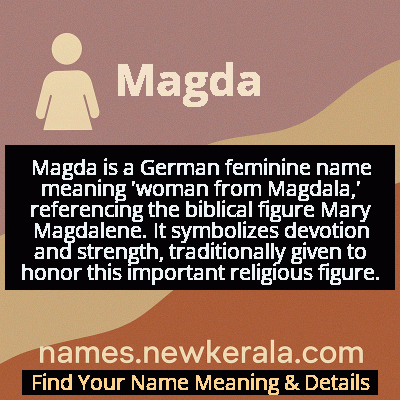Magda Name Meaning & Details
Origin, Popularity, Numerology Analysis & Name Meaning of Magda
Discover the origin, meaning, and cultural significance of the name MAGDA. Delve into its historical roots and explore the lasting impact it has had on communities and traditions.
Name
Magda
Gender
Female
Origin
German
Lucky Number
8
Meaning of the Name - Magda
Magda is a German feminine name meaning 'woman from Magdala,' referencing the biblical figure Mary Magdalene. It symbolizes devotion and strength, traditionally given to honor this important religious figure.
Magda - Complete Numerology Analysis
Your Numerology Number
Based on Pythagorean Numerology System
Ruling Planet
Saturn
Positive Nature
Ambitious, efficient, realistic, and authoritative.
Negative Traits
Materialistic, stressed, confrontational, and can be overly ambitious.
Lucky Colours
Dark blue, black.
Lucky Days
Saturday.
Lucky Stones
Blue sapphire, amethyst.
Harmony Numbers
2, 4, 6.
Best Suited Professions
Business leaders, managers, financial services, law enforcement.
What People Like About You
Leadership, determination, organizational skills.
Famous People Named Magda
Magda Goebbels
Political Figure
Wife of Nazi Propaganda Minister Joseph Goebbels and one of Adolf Hitler's closest associates
Magda Szabó
Writer
Hungarian novelist and poet, author of 'The Door', considered one of Hungary's most important modern writers
Magda Olivero
Opera Singer
Italian soprano renowned for her verismo performances and dramatic interpretations
Magda Vasaryova
Actress and Diplomat
Slovak actress and former ambassador to Austria and Poland
Name Variations & International Equivalents
Click on blue names to explore their detailed meanings. Gray names with will be available soon.
Cultural & Historical Significance
The name's association with Mary Magdalene has given it layers of meaning related to transformation, loyalty, and feminine spiritual power across various Christian cultures. In Central and Eastern Europe, Magda became particularly prominent during the 19th and 20th centuries, often chosen by families seeking to honor both religious tradition and strong female identity. The name's evolution from its biblical roots to modern usage reflects changing attitudes toward women's roles while maintaining connections to heritage and faith.
Extended Personality Analysis
Women named Magda are often perceived as strong-willed, intelligent, and deeply intuitive individuals. They tend to possess a natural leadership quality combined with emotional depth, making them both practical problem-solvers and empathetic companions. The name carries connotations of resilience and transformation, suggesting someone who can overcome challenges and reinvent themselves when necessary. Magdas are typically seen as loyal friends and dedicated professionals who approach life with both passion and pragmatism.
Their combination of spiritual depth and worldly competence often makes them influential figures in their communities and workplaces. People with this name are frequently described as having a quiet strength that commands respect without being overtly aggressive. They tend to be observant and thoughtful, preferring to understand situations thoroughly before taking action. The historical and cultural weight of the name seems to imbue its bearers with a sense of purpose and the ability to navigate complex emotional landscapes while maintaining their core values and integrity.
Modern Usage & Popularity
In contemporary times, Magda maintains steady popularity in German-speaking countries and Central Europe, though it has become less common than its full form Magdalena. The name experienced peak popularity in the mid-20th century and has since settled into a classic, somewhat traditional choice. In recent years, there's been a slight resurgence as parents seek names with historical depth and strong cultural roots. While not among the top-ranking names in most countries, it remains a respected choice that conveys both tradition and strength, particularly appealing to families with German or Central European heritage. The name's usage patterns show it being favored by educated, culturally aware parents who appreciate its historical significance and elegant simplicity.
Symbolic & Spiritual Meanings
Symbolically, Magda represents transformation, devotion, and feminine strength. The name's connection to Mary Magdalene imbues it with meanings of redemption and spiritual awakening, suggesting someone who undergoes significant personal growth. It also symbolizes loyalty and unwavering commitment, reflecting Mary Magdalene's steadfast devotion to Jesus. The geographical origin 'woman from Magdala' adds layers of meaning related to place and identity, suggesting someone grounded yet capable of great journeys. The name carries the symbolic weight of a woman who maintains her integrity and faith through challenging circumstances, embodying both practical resilience and deep spiritual connection.

